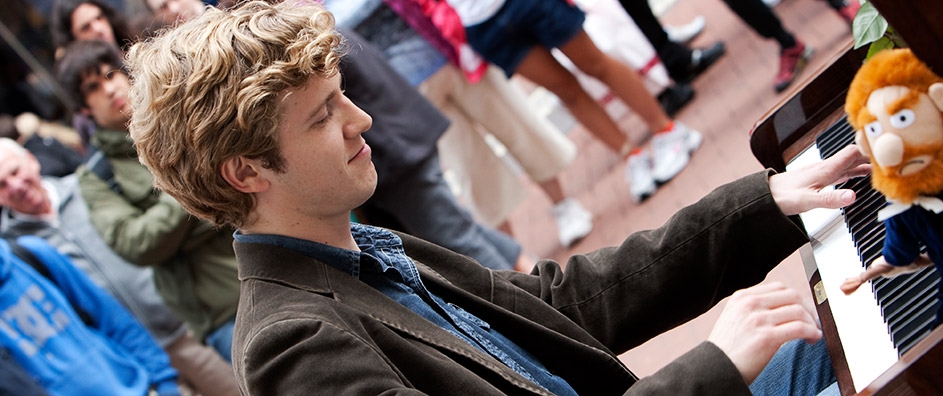The views expressed in our content reflect individual perspectives and do not represent the authoritative views of the Baha'i Faith.
In a most inspiring hour and a half workshop at the Grand Canyon Baha’i Conference in Arizona in December, internationally-acclaimed singer/songwriter Luke Slott created a new piece of music interactively with the crowd. Watch it below:
Luke Slott is a member of the Baha’i Faith, so he had a member of the audience choose a quote from the Baha’i writings—and he promised them that by the end of the hour, he would have that quote put to music, which he did! Watch and listen below:
Before doing so, he expressed his thoughts on how music is created and where the art actually comes from.
“Do you know how Bach learnt to compose music? He studied Vivaldi,” Slott said. “And you know how Mozart learned to compose music? He studied Bach… and Beethoven studied Mozart and Schubert studied Beethoven, and on and on…. All the way to now Taylor Swift and Adele and Pharrell.”
Slott introduced the idea of imitation as a positive means of gaining inspiration for a new work of art. In essence, he said, imitation doesn’t require copying anyone, but rather, gaining inspiration and infusing it with your passion for creation, thereby enabling you to create a new sound of your own.
“Before the Beatles were the Beatles, when they were kids, John Lennon said he saw Elvis Presley play music on TV and he said ‘I want to do that,’” Slott continued. “Really this is the same for all of us. If we make music, why do we do it? It’s because we have heard music that we love. I think that’s one of the most universal reasons why anyone becomes a musician—because we have heard music and we loved it. So what’s the first thing we do? We imitate. And by that I mean, we learn from the past.” Listen to some of Luke’s music below:
Slott talked to the crowd about the process that happens when you start to play art and hear it in your own way. “Anyone who has learned an instrument knows that one of the best way to learn is to play songs,” Slott said. “When you are doing that, you are doing the first stage of imitation. You are learning to play something you love. But what happens when you start to play the music that you heard and that you love? You start to learn it and copy it and imitate it and try to recreate what you heard. Then assimilation happens. You start to absorb what you’re playing. Maybe even unconsciously, you are picking up how the music works—how a song feels to play, how a song is structured. You’re learning how music works through the act of copying the great masters before you. This is how great music has progressed and evolved.”
The idea is that we are not in a vacuum; there are constant forces around us that drive our thought patterns. Regarding this, Slott draws on the word of God to help him keep his thoughts in a positive place. “Our environment is always influencing us. So there is a responsibility we have to always be turning our souls to good things rather than destructive things,” says Slott. “Abdul-Baha describes this in the context of meditation. He says the faculty of meditation:”
…brings forth from the invisible plane the sciences and arts. Through the meditative faculty inventions are made possible, colossal undertakings are carried out; through it governments can run smoothly. Through this faculty man enters into the very Kingdom of God…The meditative faculty is akin to the mirror; if you put it before earthly objects it will reflect them. Therefore if the spirit of man is contemplating earthly subjects he will be informed of these. But if you turn the mirror of your spirits heavenwards, the heavenly constellations and the rays of the Sun of Reality will be reflected in your hearts, and the virtues of the Kingdom will be obtained. Therefore let us keep this faculty rightly directed—turning it to the heavenly Sun and not to earthly objects—so that we may discover the secrets of the Kingdom, and comprehend the allegories of the Bible and the mysteries of the spirit. May we indeed become mirrors reflecting the heavenly realities, and may we become so pure as to reflect the stars of heaven. – Paris Talks, pp. 175-176.
He continued to discuss the role of hard work in creating art, joking that “genius is 1% inspiration, and 99% perspiration,” but reiterating the importance of gaining our inspiration from a positive place within ourselves. Slott quoted Baha’u’llah:
The whole duty of man in this Day is to attain that share of the flood of grace which God poureth forth for him. Let none, therefore, consider the largeness or smallness of the receptacle. The portion of some might lie in the palm of a man’s hand, the portion of others might fill a cup, and of others even a gallon-measure. – Gleanings from the Writings of Baha’u’llah, p. 8.
We all have these different capacities, Slott pointed out, reminding the crowd that they are not to be compared, they are to be found and discovered within ourselves.
“The Baha’i Faith has given my life and my art, direction, meaning and purpose,” Slott said. “It’s given me a flood of inspiration. It’s also given me a structure to channel that inspiration. It’s given me a structure to make the most of the inspiration I find.”
He discussed the importance of balancing the heart and mind when creating art, and how that can lead to the greatest levels of creativity. “In the workshop we just did we were exploring the concept of art having a form,” Slott said. “As a musician, the Baha’i Faith has taught me a lot about form and feeling, not just in the art of music but also in life. The importance of using both your mind and your heart—I think that so many of the Baha’i teachings express the importance of this kind of balance that we’re all seeking between the mind and the heart, and how the mind and the heart can really work together, how our intellect, intuition and feelings can work together. I think that is often the essence of really great art.” Watch the interview below:
As for where Slott finds inspiration himself? A lot of it comes from the universal themes most of the world grapples with, all addressed in the Baha’i teachings. “Many of the best songs that have ever been written are about themes that are beautifully articulated in the Baha’i writings,” he said. “For example the theme of crisis and victory, is an element of life that is universal. Every human being has crises in life; every human being has victories in life. That is often something I try to express in songs when I write because it’s a universal experience. When I do write songs I try to express something that is universal, something people can relate too. Going to the Baha’i writings and going to Baha’i history for inspiration is really like a paradox, because it sounds like I am going to something specific, but I am using something specific to inspire me to express something universal.”
Listen to more of Luke’s music on his music.lukeslott.com
















Comments
Sign in or create an account
Continue with Googleor